Home Energy Assessments
A home energy assessment, also known as a home energy audit, is the first step to assess how much energy your home consumes and to evaluate what measures you can take to make your home more energy efficient. An assessment will show you problems that may, when corrected, save you significant amounts of money over time.
Learn about the steps and benefits of a comprehensive home energy assessment in this video. Text version
During the assessment, you can pinpoint where your house is losing energy. Energy assessments also determine the efficiency of your home’s heating and cooling systems. An assessment may also show you ways to conserve hot water and electricity. You can perform a simple energy assessment yourself, or have a professional energy auditor carry out a more thorough assessment.
A professional auditor uses a variety of techniques and equipment to determine the energy efficiency of a structure. Thorough assessments often use equipment such asblower doors, which measure the extent of leaks in the building envelope, and infrared cameras, which reveal hard-to-detect areas of air infiltration and missing insulation.
Here you’ll find the following information:
The Home Energy Audit – A Thorough Evaluation Of Your Home.
A Home Energy Audit will tell you exactly where your home is leaking energy and help you target the trouble spots. The Audit Report includes digital and infrared photos along with documentation to help you determine the best course of action. The Home Energy Audit is a whole house health, comfort, and energy checkup of your home. It is a thorough evaluation of your South Carolina home and it’s central heating and cooling system. The home is actually part of the system and plays a very large roll in your comfort level.
Do You Have Hot or Cold Spots?
A Whole House Health, Comfort, and Energy Checkup will get to the bottom of why, and what you can do about it.
Do Family Members Suffer From Allergies or Asthma?
Your home may be contributing to your suffering. A Whole House Health, Comfort, and Energy Checkup will help identify ways to make your home healthier and safer.
Is Your Home Too Dry or Too Humid?
Improper humidity control can cause static shocks, dry skin and bloody noses in the winter and mold, mildew and structural damage in the summer. This will identify ways to help you control the humidity in your home.
Are Your Utility Bills Too High?
According to the Department of Energy, the typical home wastes 25% to 40% of the energy put out by the central heating and cooling system. Are you throwing away 25 to 40 cents out of every utility dollar? Find out if you are and how to stop it.
Planning To Replace Your System?
Remember prescription without diagnosis is malpractice. We often find that people want to change their equipment thinking it will solve the problems described above. When in fact it isn’t the problem to begin with. A Whole House Health, Comfort, and Energy Checkup will help you to understand the problems and also provide solutions for them.
Here’s How A Whole House Health, Comfort, and Energy Savings Check-up Works:
A specially trained Comfort Consultant will visit your home, using advanced diagnostic instruments and testing procedures, and will identify problems that affect your indoor living environment. Your consultant will then provide you with a personalized plan to solve these problems, permanently.
Your checkup starts with an initial interview with your Comfort Consultant. Your input provides valuable information, such as whether any rooms feel clammy when the air conditioner is running, or if any parts of the house need to be dusted more often than others. We encourage all of the adults in your home to participate in this initial consultation since everyone’s perception of comfort and indoor air quality is unique.
 Initial Consultation
Initial Consultation
The inspection begins with your heating and cooling equipment. Is it efficient, dependable and safe? Your consultant will visually inspect your equipment for any signs of deterioration, improper installation, or insufficient maintenance. He will let you know the average life span of your type of equipment. He will also evaluate your system’s air filtration and purification efficiency, to determine if improvements would better clean your indoor air.
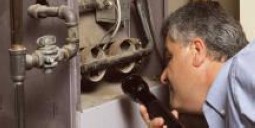 Equipment Inspection
Equipment Inspection
Even the best heating and cooling system will have trouble keeping you comfortable or will cost more to run if you don’t have proper insulation. Your consultant will visually inspect insulation levels throughout your home and determine if they meet current recommended levels. More importantly, he will look for hidden defects, such as hollow wall cavities, that allow air and heat to bypass your insulation. Attic ventilation will also be checked.
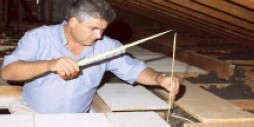 Insulation Inspection
Insulation Inspection
All houses should have some air leakage but most leak too much. Symptoms of excessive leakage include uneven temperatures throughout the house, high utility bills, excessive dust, cold drafts, dry air in the winter, and clammy air in the summer. On the other hand some homes are too airtight and may have unhealthy and stale indoor air. To measure a homes air tightness, Department of Energy scientists at Princeton University invented the blower door instrument. It is often featured in magazines and on television, including National Geographic, Better Homes and Gardens, Popular Science, and This Old House.
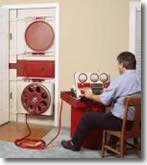 Infiltrometer Blower Door Test
Infiltrometer Blower Door Test
Using an Infiltrometer (a computerized blower door system) your consultant will evaluate how leaky or airtight your entire home is, and where improvements can be made. Not all air leaks are created equal. From an indoor air quality standpoint, those around your windows and doors are good leaks, since they let in fresh outdoor air. Bad leaks let in dusty, moldy or polluted air from your attic, garage, or crawl space. Leaky air ducts often bring in dirty air, and cause your heating and cooling equipment to perform well below peak efficiency. As part of the infiltrometer blower door test, your consultant will pinpoint where your home’s worst air leaks are, and where improvements can be made.
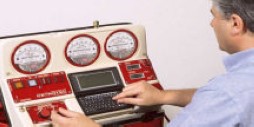 Air Leakage Evaluation
Air Leakage Evaluation
With the use of an Infrared camera we are able to see through the walls and see hot or cold spots. Having this ability helps us to determine whether there is adequate insulation or whether there are other problems that are not visible to the naked eye.
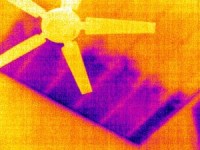 Infrared Camera Inspection
Infrared Camera Inspection
If your air duct system has hidden design flaws or blockages, your air flow will be restricted or unevenly distributed. This wastes your money and can make your home uncomfortable. Studies conducted for electric utilities nationwide show that over 66% of air conditioners suffer from this problem. Your consultant will conduct static pressure tests – like a blood pressure check for your ducts – to reveal any hidden blockages or design problems.
Air Flow Diagnosis
Do you have rooms that are hard to heat or cool? There are economical solutions. Your consultant will use an air flow capture hood to measure precisely how much conditioned air is getting to those rooms (provided the supply vents are accessible). If air flow is low, the causes will be determined, and appropriate solutions will be prescribed.
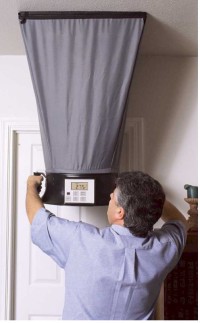 Electronic Air Flow Capture Hood Test
Electronic Air Flow Capture Hood Test
Once the inspection and testing are complete, your consultant will explain the results, and give you a prioritized plan of recommended improvements. Many, such as adding insulation or weather-stripping – can be performed by homeowners as weekend projects. Other improvements may require professionals. Upon request, your consultant will prepare a proposal for repairs that Air Concepts Solutions, LLC. can perform, and can recommend other contractors for services we do not offer.
Personalized Improvement Plan
During your Whole House Health, Energy, and Comfort Checkup, you will learn how to:
- Achieve even, comfortable temperatures throughout your home
- Maintain healthy, comfortable humidity levels year-round
- Reduce dust, system noise and repair bills
- Save money on your utility bills (typically between 20% and 50%)
Call today to arrange a Whole House Health, Comfort, and Energy Savings Checkup for your home.
Air Concepts Solutions, LLC. offers a 100% Satisfaction Guarantee on the Whole House Health & Comfort Checkup. Upon completion of your Checkup, if you did not find the service worthwhile then you shouldn’t pay for the checkup!
-
Available Federal, Local and Utility Energy Efficiency Incentives
The systems you now use or choose to have installed may qualify for energy efficiency savings.
Federal Energy Efficiency Tax Credits (EESA -2009) Updated to include 2011 Stimulus Plan Incentives.
Click here to learn which investments and improvements qualify for up to hundreds of dollars in tax rebates. Some are retroactive to 2008, others are available through 2016.
Additional State, Local and Utility Incentives
Click here or on the image below and then on your state to learn about additional energy savings for which you may qualify.
Relevant Information for HVAC Contractors about Section 25c Provisions
The provisions of the 2009-2010 American Recovery and Reinvestment Act (ARRA) tax credits expired on December 31, 2010, giving way to new limits and guidelines as outlined in Section 25c, the Tax Relief, Unemployment Insurance Re-authorization and Job Creation Act of 2010. What changed, and what are the new parameters?
Effective dates: January 1 through December 31, 2011
Maximum amount eligible for claim: 10% of eligible costs up to maximum of $500. But there are varying limits, depending on what the energy improvement is, plus homeowners must meet the eligibility requirements as well (see below).
Homeowner eligibility: Since the credits have reverted to lifetime caps, homeowners who have claimed $500 or more in Section 25c tax credits since 2005 are ineligible for Section 25c credits in 2011. Plus, as before, installation must be on homeowner’s primary home.
Efficiency ratings: Section 25c increases the qualifying standards for oil furnaces and natural gas, oil or propane hot water boilers to 95% AFUE. The qualifying standards for natural gas and propane furnaces remain at 95% AFUE.
Eligible Equipment:
- Central Air Conditioners: 16 SEER and 13 EER = $300 credit
- Heat Pumps: 15 SEER and 12.5 EER = $300 credit
- Natural Gas Furnaces: 95% AFUE = $150 credit
- Advanced Main Air Circulating Fan: ECM Blower = $50 credit
- Ductless Split System Heat Pumps: 15 SEER, 8.5 hspf, 12.5 EER = $300 credit
- Ductless Split System Air Conditioners: 16 SEER, 13 EER = $300 credit
- Water Heaters: EF of 82+ = $300 credit
- Boilers: AFUE of 95%+ = $150 credit
Section 25c also includes provisions for building envelope improvements, including insulation materials and systems, exterior doors and windows, and pigmented metal or asphalt roofs. Read more from DSIREusa.org. Note that the material on this site includes provisions for the ARRA tax credits which just expired, as well.
What about solar and geothermal? The tax credits for qualifying solar and geothermal products remain at the previous 30% levels through December 31, 2016, and have no cap. Products included in this segment can be installed in new or existing homes, and include items on the following list. For more details about solar and geothermal incentives, visit EnergyStar.org.
- Geothermal Heat Pumps
- Solar Panels
- Solar Water Heaters
- Small Wind Energy Systems
- Fuel Cells
Download a printable copy of this information.
Download a printable chart comparing the ARRA and Section 25c guidelines.
Links to ARRA and Section 25c Related Articles
The ARRA billText of the ARRA bill (310 pages, PDF format)
DSIREusa.orgComprehensive incentive information from federal to municipal levels whether Stimulus Package related or not. DSIRE has collected and reported incentive data since 1995.
- State IncentivesList of new incentives by state from DSIRE.org
- Organizations and AssociationsLinks to relevant organizations and associations
- State Regulations & PoliciesSummary of state-by-state rules, regulations and policies for incentives from DSIRE.org
- State Energy Efficiency IncentivesSummary of state-by-state financial incentives for energy efficiency from DSIRE.org
Industry Reports:
- ASHRAE Special Report (ARRA)
- McGraw-Hill briefings (ARRA)
Current developments, blogs, industry news
Dept of Energy: Standards and guidelines
Energy Star – Ongoing incentives not related to the ARRA Stimulus
- Energy Star Products
- Listing of products that qualify for Energy Star rating
- Federal Tax Credits for Energy Efficiency
- Energy Star installation costs – Outlines what installation costs are covered
- Homeowner Tax Credits – Summarizes Energy Star tax credits for Homeowners and notes requirements for receiving
- Energy Star Partner Rebates and Special Offers search tool
Tax Deductions for Commercial Buildings
Guidelines for how to capture a commercial building’s overall energy consumption
The official website for the ARRA Stimulus Package.
Please call us today for your energy audit to help reduce energy costs.
We Thank You for Your Business…
Air Concept Solutions provides reliable and affordable HVAC and energy audits for the local Summerville, Goose Creek and greater Charleston, SC area. We have been in business for over 35 years. Give us a call and we’ll help you get your energy costs down.


